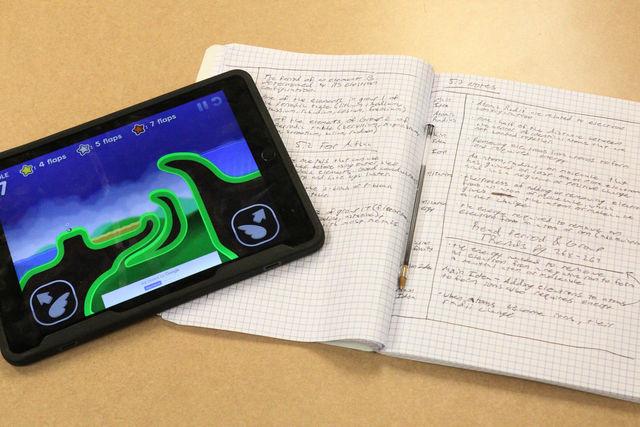Photo by Raymond Link ’20 | A student’s IPad acts as a distraction during a session of notes.
By Joey Bottini ’19
THE ROUNDUP
A study published in 2009 by Professor Joseph Ferrari of DePaul University in Chicago, IL. Ferrari estimated that 15 to 20 percent of people are chronic procrastinators.
“We now have data on 4,000 people, and it doesn’t seem to matter what age you are, or your sex or background,” said Ferrari.
Procrastination has been a problem for centuries, but with the rise of technology, there are many that believe it is only getting worse.
Professor Piers Steel from Calgary University in Canada learned in his research that the “incidence of chronic procrastination has risen dramatically in recent decades, from one person in 20 to one in four.
Steel indicated that this rise in chronic procrastination has risen directly with the dominance of technology in society.
In schools across America, technology in the classroom has become the norm, and it has an effect on a student’s attention span, both in class and doing work at home.
Students in modern times struggle to focus in class when they have access to entertainment at the tip of their fingers, such as YouTube, Twitter and gaming applications.
Nearly 90 percent of teachers believe that digital technologies create an easily distracted generation with short attention spans, according to a Pew Research Study.
Brophy student Owen Blake ’19 spoke about how easy accessibility and vast amounts of different technology can drastically affect the completion time of many of his assignments.
“There is no doubt in my mind that technology has led many students, myself included, to procrastinate during homework and studying,” said Blake. “I truly believe that I could finish most of my homework each night in just 30 minutes if the distractions of technology weren’t available to me.”
These are the struggles of many students who tend to use the more enjoyable facets of technology instead of schoolwork despite the incredible outlet to gather information that technology gives scholars.
While technology may cause our rising generation to be time-wasters, I believe that the knowledge that is able to be gained from the Internet is far more significant.
The access to knowledge on the Internet is unlimited with the technology of present-day. When students use this for wisdom rather than entertainment, they can learn quicker than ever before in human history.
The problem, however, is that middle school to high school students with access to technology simply are not mature enough to choose education over amusement.




















